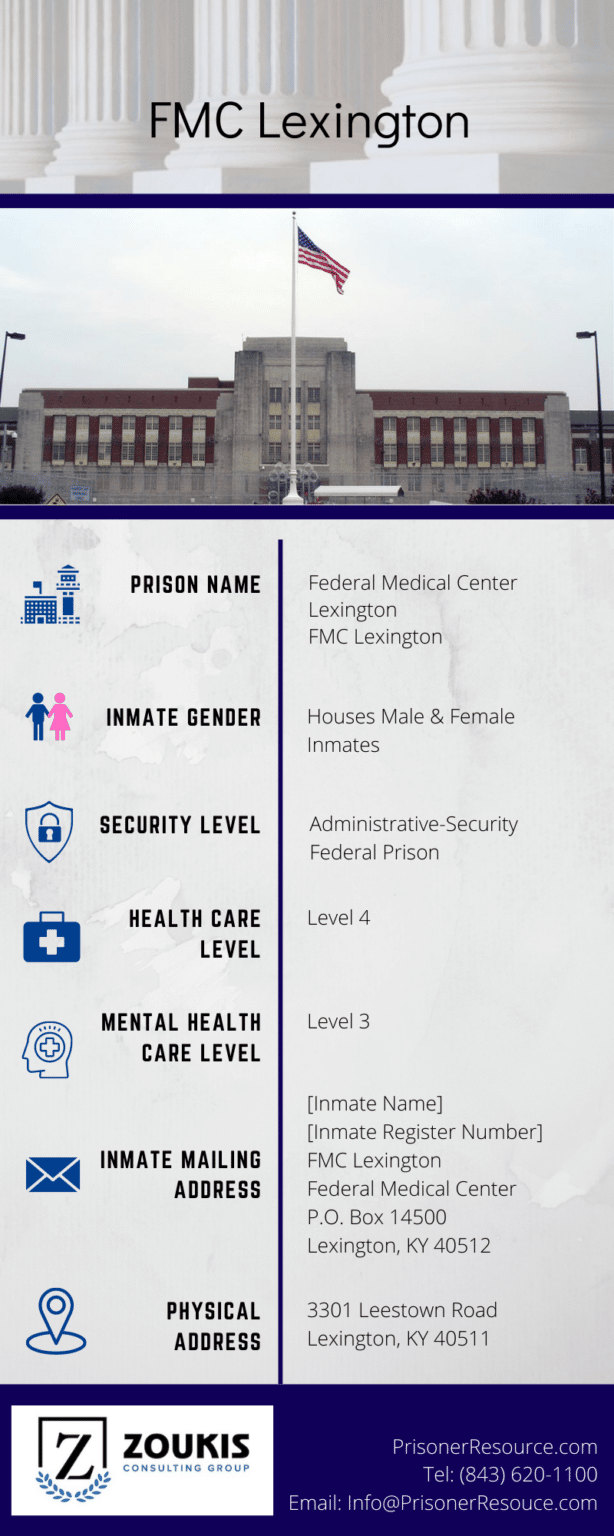The Complete Guide to Federal Medical Center Lexington: Everything Explained
Navigating the complexities of the federal justice system can be daunting, and understanding the role of facilities within it, such as the Federal Medical Center (FMC) Lexington, is crucial. This comprehensive guide provides an in-depth look at FMC Lexington, offering clarity on its purpose, the services it provides, the types of inmates it houses, and more. Whether you’re a family member seeking information or simply curious about the federal prison system, this article aims to answer your questions and provide a clear understanding of FMC Lexington.
What is the Federal Medical Center Lexington?
FMC Lexington, located in Lexington, Kentucky, is a federal prison operated by the Federal Bureau of Prisons (BOP). Unlike standard correctional facilities, FMC Lexington specializes in providing medical and mental health care to federal inmates. It serves as a central hub for the BOP, offering a wide range of specialized medical services that might not be available at other facilities. This makes it a critical component of the federal prison system, ensuring that inmates with complex medical needs receive the necessary treatment.
The Purpose and Mission of FMC Lexington
The primary purpose of FMC Lexington is to provide comprehensive medical and mental health care to federal inmates. Its mission is centered around:
- Providing Medical Care: Offering a spectrum of medical services, including primary care, specialized treatment, and surgery.
- Mental Health Services: Delivering mental health assessments, therapy, medication management, and support programs.
- Custodial Care: Maintaining a safe and secure environment for inmates while providing care.
- Rehabilitation: Offering programs designed to help inmates rehabilitate and reintegrate into society upon release (though this is often limited due to the focus on medical care).
Who is Housed at FMC Lexington?
FMC Lexington houses a diverse population of federal inmates, primarily those with:
- Significant Medical Needs: Inmates requiring specialized medical attention, including chronic illnesses, post-surgical care, and complex medical conditions.
- Mental Health Conditions: Inmates with diagnosed mental illnesses requiring treatment, therapy, and medication.
- Sentenced and Pre-Trial Detainees: The facility accommodates both sentenced inmates and those awaiting trial or sentencing who require medical or mental health services.
- Designated Populations: The BOP may designate specific inmates to FMC Lexington based on their medical needs or other factors.
Services Offered at FMC Lexington
FMC Lexington boasts a wide array of services, including:
- Medical Services:
- Primary Care
- Specialist Consultations (e.g., cardiology, dermatology, etc.)
- Surgical Procedures
- Dental Care
- Pharmacy Services
- Diagnostic Imaging (X-rays, MRI, etc.)
- Emergency Medical Services
- Mental Health Services:
- Psychiatric Evaluations
- Individual and Group Therapy
- Medication Management
- Crisis Intervention
- Substance Abuse Treatment Programs
- Other Services:
- Religious Services
- Educational Programs (GED, vocational training – may be limited)
- Recreational Activities
- Commissary (for purchasing essential items)
- Visitation (subject to BOP regulations)
Important Considerations for Family and Friends
If a loved one is incarcerated at FMC Lexington, it’s essential to understand the following:
- Communication: Inmates have limited access to telephones and mail, which are regulated by BOP policies.
- Visitation: Visitation schedules and rules are strict and subject to change. Check the BOP website for the most up-to-date information.
- Sending Money: You can send money to an inmate’s commissary account through various methods, including Western Union and the BOP’s electronic deposit system.
- Medical Information: Due to privacy laws, obtaining specific medical information about an inmate can be challenging. You may need to obtain a release of information from the inmate.
- Legal Assistance: If you have concerns about an inmate’s care or treatment, consider consulting with an attorney specializing in federal prison law.
Navigating the BOP and FMC Lexington
The BOP website (www.bop.gov) is the primary resource for information about FMC Lexington and the federal prison system. You can find:
- Inmate Locator: Search for an inmate by name and register number.
- Visiting Regulations: Detailed information on visitation schedules, dress codes, and prohibited items.
- Inmate Handbook: A comprehensive guide to inmate rights, responsibilities, and facility rules.
- Contact Information: Address, phone number, and other contact details for FMC Lexington.
Understanding the Challenges of Medical Care in a Prison Setting
It’s important to acknowledge that providing adequate medical care within a prison environment presents unique challenges. These can include:
- Limited Resources: Budget constraints can impact the availability of specialized equipment, medications, and staff.
- Staffing Shortages: Recruiting and retaining qualified medical professionals can be difficult.
- Security Concerns: Security protocols can sometimes hinder access to medical care.
- Patient Compliance: Inmates may not always comply with medical treatment plans.
- Mental Health Issues: Addressing mental health needs in a prison setting can be complex and require specialized expertise.
Conclusion: A Vital Component of the Federal Prison System
FMC Lexington plays a critical role in the federal prison system, providing essential medical and mental health care to inmates with complex needs. Understanding its purpose, the services it provides, and the challenges it faces is crucial for both those incarcerated and their loved ones. By utilizing the resources provided by the BOP and seeking legal assistance when needed, individuals can navigate the complexities of the federal prison system and ensure their loved ones receive the care they require.
Frequently Asked Questions (FAQs)
1. How can I find out if an inmate is housed at FMC Lexington?
You can use the Federal Bureau of Prisons (BOP) Inmate Locator tool available on the BOP website (www.bop.gov). You’ll need the inmate’s full name and, ideally, their inmate registration number.
2. What are the visitation rules at FMC Lexington?
Visitation rules are subject to change. The most up-to-date information can be found on the BOP website. You’ll typically need to be on an approved visitation list and adhere to specific dress codes and regulations regarding prohibited items.
3. How can I send money to an inmate at FMC Lexington?
You can send money to an inmate’s commissary account through various methods, including the BOP’s electronic deposit system, money orders, and Western Union. Details on these methods are available on the BOP website.
4. Can I send mail to an inmate at FMC Lexington?
Yes, you can send mail to an inmate. However, there are specific guidelines regarding the content and format of the mail, as well as prohibited items. These guidelines are available on the BOP website.
5. How do I contact FMC Lexington directly?
You can find the contact information for FMC Lexington (address, phone number) on the BOP website.




